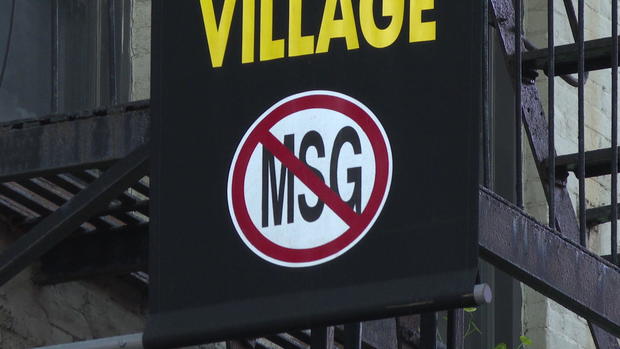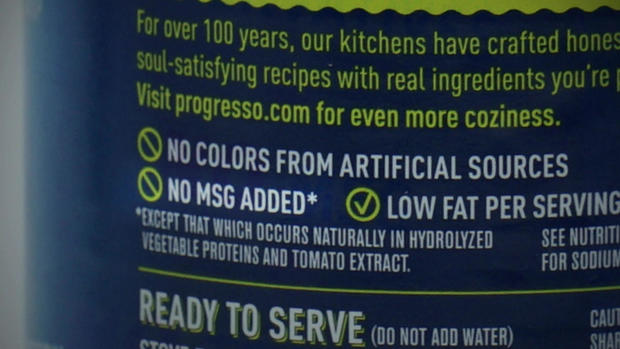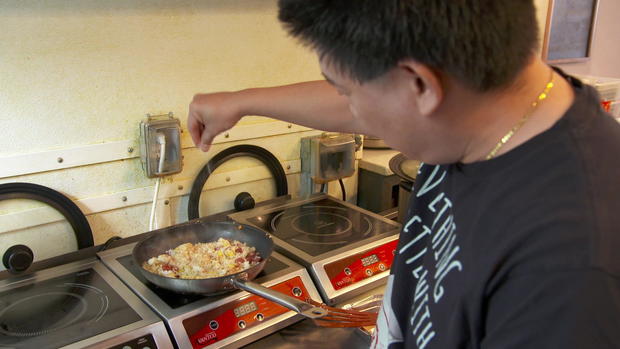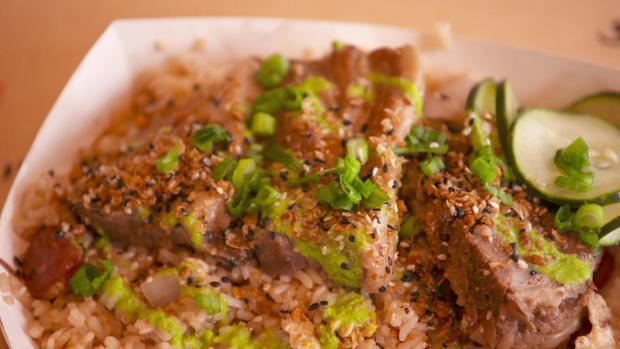Americans LOVE Chinese food; at one point on election night in 2020, Google searches to find some outnumbered searches for who had won the Presidency. But you’ll still see signs around reading “No MSG,” in restaurant windows, menus and on food packages. Have you ever wondered why?
Back in 1968, the New England Journal of Medicine published a letter written by a doctor titled “Chinese Restaurant Syndrome.” The doctor described feeling sick after eating a meal at a Chinese restaurant, mentioning such symptoms as headache, palpitations, nervousness and dizziness.
CBS News
Tom Sherman, a biochemist and nutrition expert at Georgetown University, says the letter sparked decades of research, and confusion, over MSG … even an entry in the dictionary for “Chinese restaurant syndrome.”
But the upshot today? “The evidence is complete,” Sherman said. “Data in multiple studies conducted multiple different ways with human subjects has never found any evidence for toxicity of MSG. And people get sucked into believing, you know, because I ate this, and this happened, it was what I ate. And that’s frequently not the case.”
MSG (Monosodium glutamate) is basically a concentrated form of glutamate. It has about one-third of the sodium found in table salt. It occurs naturally in many foods, from cheese and tomatoes to corn.
CBS News
Sherman said, “I don’t want to pretend like it’s good to eat MSG, but it certainly isn’t bad.”
Researchers say some people may be sensitive to MSG, but health authorities, from the FDA to the World Health Organization, have deemed MSG safe in the amounts found in food.
MSG is used all over the globe, and is found in everything from fast foods to snacks to canned soups. Americans eat on average about half a gram of MSG per day.
But the term “Chinese restaurant syndrome” has marinated long enough in the U.S. that it’s left a sour note to Chinese American chefs like Chris Cheung, who runs the East Wind Snack Shop chain in Brooklyn, New York.
“I openly admit that I use it in my food, and I have no problems with it,” Cheung said. “It’s no different than salt and pepper, and it just adds a depth of savory-ness to food.”
CBS News
Cheung said the lingering stigma against MSG may have more to do with xenophobic views than with food science: “I’ve worked in Japanese kitchens, I’ve worked in Thai kitchens, a lot of kitchens that weren’t Chinese, and they all use MSG to some extent,” Cheung told NPR correspondent Allison Aubrey. “But I’ve only heard in the Chinese environment the request for no MSG: ‘Don’t put MSG in the food. I know you guys use it in China, but you live in America now.'”
“There’s not ‘Italian restaurant syndrome,’ or ‘Mexican restaurant syndrome,'” said Tia Rains, senior director of public relations for Ajinomoto, one of the leading makers of MSG. The company led a successful campaign to have Merriam-Webster update the term “Chinese restaurant syndrome” as “dated” and “offensive”; and another campaign took aim at the phrase, “No MSG.”
For one thing, MSG was not discovered in Chinese restaurants. It was a Japanese chemist, Kikunae Ikeda, co-founder of Ajinomoto, who first extracted MSG from seaweed over 100 years ago. Today in the U.S., Ajinimoto extracts glutamate from corn, and the flavoring is produced at a factory in Iowa.
For Rains, MSG’s reputation can still be tough to swallow: “We are trying to bring these facts forward at this time so that people aren’t afraid when they see monosodium glutamate on a food label, or they’re not afraid to have it in their kitchen and use it in their cooking.”
Let people taste for themselves, is the takeaway for Chris Cheung, too, one takeout at a time. “If you give it a try, it’s not really going to have those effects that everybody says it will,” he said. “I’m just here to tell you, if you choose to believe me, what lies ahead of you is some really, really great meals.”
CBS News
For more info:
Story produced by Young Kim. Editor: Steven Tyler.

 Latest Breaking News Online News Portal
Latest Breaking News Online News Portal








